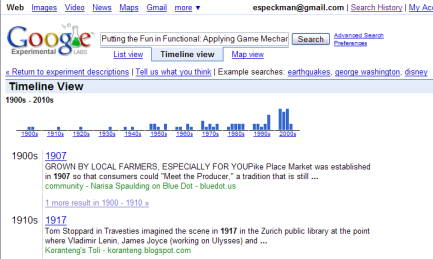Anil Dash is pretty down on the new maps in iOS 6.
But this time, they’re right: Apple’s made a new product that actually is pretty but dumb. Worse, they’ve used their platform dominance to privilege their own app over a competitor’s offering, even though it’s a worse experience for users. This is the new Maps in iOS 6.
The root of the issue: from iOS 1.0 through iOS 5, the Map application was built on data from Google. Google’s data was used for the maps themselves along with local search, street views, walking, driving, and transit directions, and, I think, current traffic conditions. In iOS 6, Apple has dropped Google’s data, and some of the features that depended on it.
I face the change with some trepidation. If nothing else, I think the street-level views are much more useful than the fly-over views that are replacing them. I hope a Google Maps iOS app shows up real soon. That said, Dash is missing some important aspects of the issue.
His first mistake was to assume that the status quo was sustainable. Often, in business (and war) that isn’t option. In this case, it is like that continuing to use Google’s data as they had in the past was not an option for Apple.
At my last job, we depended heavily on Google’s Map API. About a year ago, Google made moves that make their maps API completely untenable for a variety of once loyal customers. They backed down to some degree, indecisiveness creates uncertainty, itself a big negative. Apple may have more leverage than most customers, but Google likely tried to push some big changes on them too.
It may have boiled down to dollars, but I wouldn’t be surprised if Google wanted to push mobile advertising into iOS maps. How would that be for users? Part of Apple’s value proposition is: you are the customer, not the product. Apple is not in the business of forcing advertising on their well paying customers.
Consider also that Apple is adding turn-by-turn navigation in iOS 6. This is something Google has offered on Android for a while now and some people have been critical of Apple for not having the feature on the iPhone. It is quite plausible that Google would not allow Apple to use their map data with a turn-by-turn navigation feature.
Dash also seems to forget that the Map apps is and has always been Apple’s. Google’s data has been integral, but it was never Google’s app. Apple has always privileged their own map application over those from others, it’s just that their map application used to be based on Google Maps.
Despite getting these things wrong, I suspect Dash is right, the Map app in iOS 6 is going to feel like a step back in a lot of ways. In the long run though, I think this is a good thing. It gives Google some competition, and hopefully it will result in improvements flowing to OpenStreet Map, which Apple is using for some of their map data.
